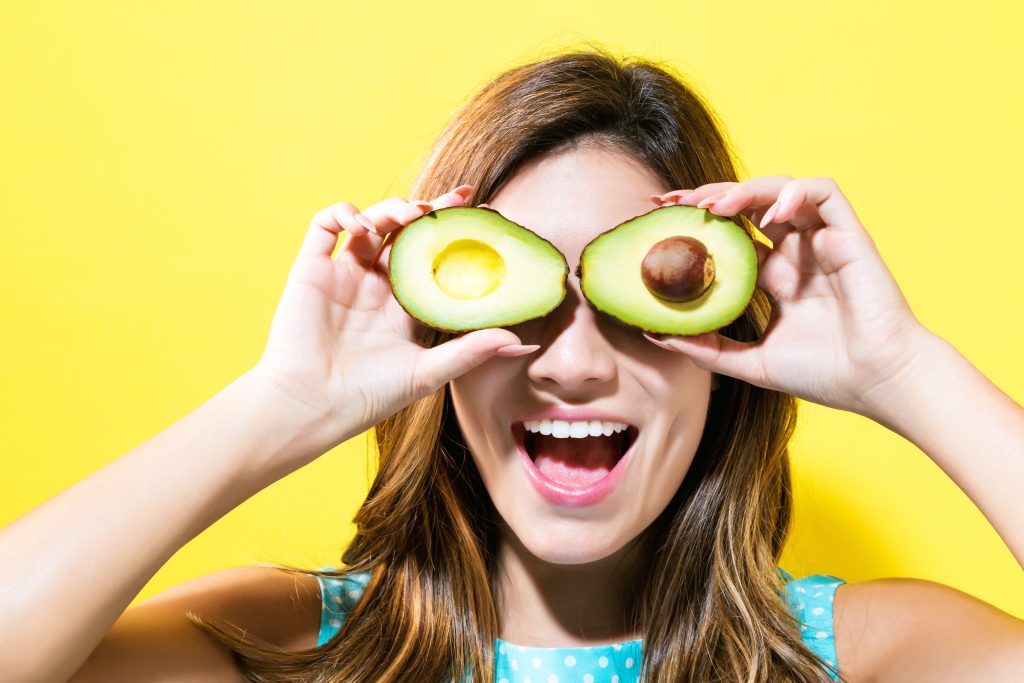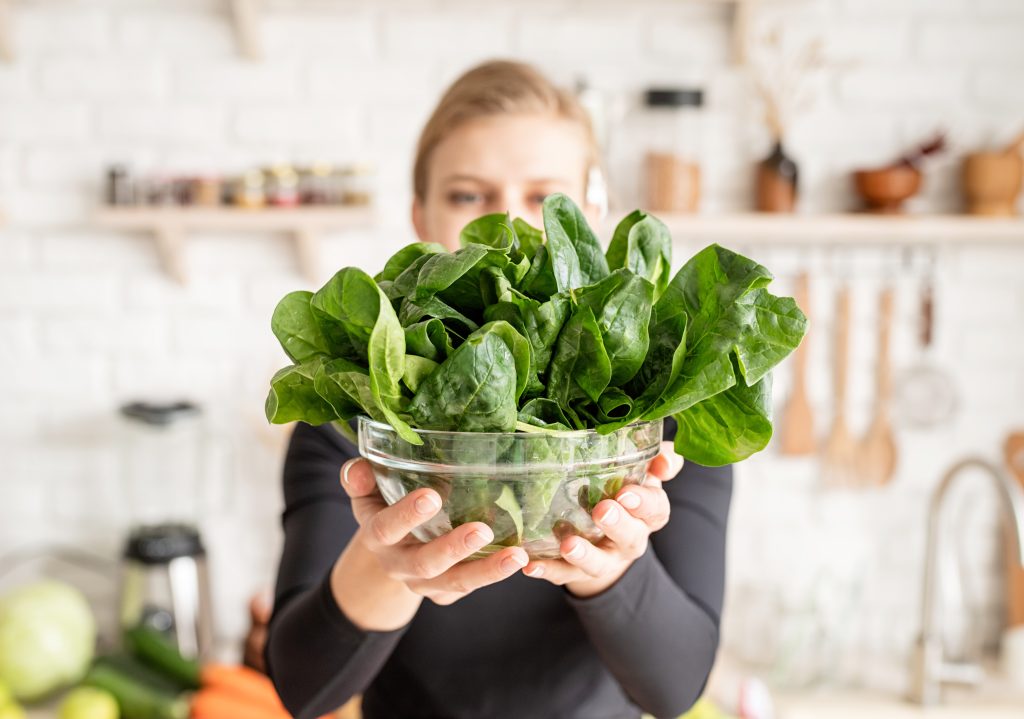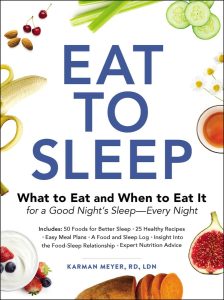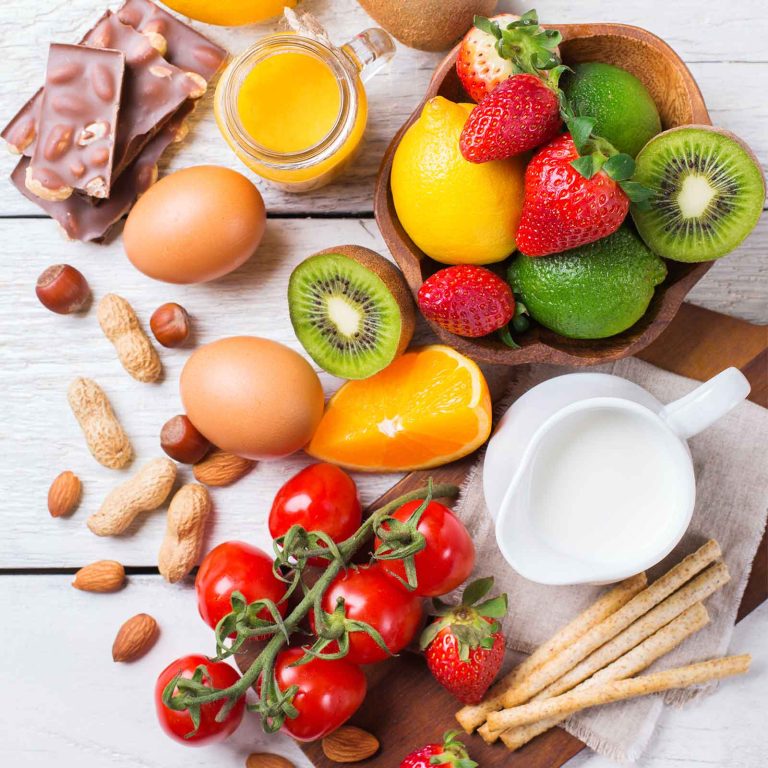WORDS: Karman Meyer
We eat to sustain life, for growth and development, for nourishment, to socialise and share meals with others, in celebration and sometimes just for pure pleasure. But have you ever thought, “I’m going to eat this so I can sleep well tonight?” What you eat and when you eat it can play a big role in whether a peaceful night of sleep lies ahead.

How Food Choices Impact Sleep
Food is responsible for fuelling everything your body does during the day and even while sleeping. Quite amazing, isn’t it?
Low blood sugar (blood glucose) levels while sleeping can lead to a stimulation in the release of adrenaline and cortisol, which promote awakening. For example, having candy or snacking on a bag of chips before bed can lead to dips in nocturnal blood glucose levels because the carbohydrates (“sugars”) in them are processed quickly by the body. A better choice for a bedtime snack would be two cups of homemade popcorn sprinkled with Parmesan cheese since popcorn is a whole grain and source of fibre that will allow for slower absorption of glucose into the bloodstream.
Too often we are told what not to eat rather than focusing on the foods we should be enjoying more of in order to feel better. One food or meal isn’t going to make or break you—it’s the overall diet that is most important.
A few “check-in” questions to ask yourself during the week are:
• Have I been eating enough fibre from fresh fruits and vegetables and whole grains?
• Do I need to add in some foods rich in omega-3s for heart-health benefits?
• Am I feeling energised throughout the day? If not, maybe I need to look at my balance of carbohydrates, protein and healthy fats or limit my intake of refined sugars or caffeine.
• Did I drink enough water or eat plenty of hydrating foods over the past few days?
THE BEST FOODS FOR SLEEP
Many of the foods listed below work in a variety of ways to benefit your body and improve the quality of sleep you get at night. Some are natural sources of melatonin, some provide the important amino acids to help your body produce melatonin and others provide the essential nutrients needed to help your body relax as you drift off to dreamland.
WHY AVOCADOS ARE GOOD FOR SLEEP
Avocado has made this list for its healthy fat content and the magnesium it contains. A serving of raw avocado provides about 15mg of magnesium, or 4 percent of the recommended daily value. Magnesium is linked to decreased stress levels and fewer inflammatory issues, which can help with getting a quality night of sleep. Adequate magnesium levels can also possibly reduce occurrence of migraines and extreme cramping during menstruation.
The high amount of monounsaturated fat and fibre in avocados can help you feel more satisfied at a meal or snack time, meaning that you’re less likely to wake up feeling hungry in the middle of the night or overeat at any particular meal during the day.

For those experiencing a roller-coaster of blood sugar levels, healthy fats like those found in avocado can help to stabilise them. A dip in blood sugar levels in the middle of the night can cause restless sleep, night sweats and headaches and this can occur in individuals with or without diabetes.
For delicious recipes featuring avocados, click here.
WHY BROWN RICE IS GOOD FOR SLEEP
Brown rice, also referred to as whole-grain rice, differs from white rice in that it still contains the bran layer and cereal germ, making it a whole grain. Since the bran layer is still in place, brown rice contains more fibre than white rice. Naturally gluten-free, brown rice is a great grain option for those who have coeliac disease or a gluten intolerance.
Brown rice is another example of a complex carbohydrate, offering numerous benefits related to getting a night of quality sleep. It’s a satiating grain, so you’ll end up feeling much fuller from a 1/2-cup serving of brown rice than you would from the same amount of white rice, plus you’ll reap many more nutritional benefits from the brown rice!
WHY BANANAS ARE GOOD FOR SLEEP
The potassium and magnesium found in bananas help with blood flow and muscle contraction and can also ease muscle cramps, all of which are important when falling asleep at night. If you’ve experienced muscle cramps or spasms in the middle of the night, you may have heard eating a banana can remedy them.
The other sleep-relevant nutrient found in bananas is vitamin B6 (pyridoxine). This B vitamin is involved in more than 150 enzyme reactions in the body, including nervous and immune system function and the processing of the protein, carbohydrates and fat that you consume. It’s also involved in the production of serotonin, often thought of as the “happy neurotransmitter.”

A deficiency of vitamin B6 may negatively affect your mood, possibly contributing to depression, anxiety and increased feelings of pain, all of which can interfere with quality sleep. As if that isn’t reason enough to ensure B6 intake is adequate, this vitamin is essential in the making of the sleep-promoting hormone melatonin.
A banana in the morning with breakfast means you’re providing the body with the right tools to construct a night of peaceful sleep!
Bananas are the hero is these recipes.
WHY ROCKMELON IS GOOD FOR SLEEP
Rockmelon is a hydrating fruit, composed of 90 percent water. Adequate hydration is important for a night of restful sleep. Foods with high water content, like rockmelon, contribute to hydration status during the day, making it easier to reach fluid recommendations.
WHY CAULIFLOWER IS GOOD FOR SLEEP
Made up of 92 percent water, cauliflower may seem like an unassuming vegetable to choose for its nutrition value, but don’t let it get by you! This cruciferous vegetable offers several nutritional benefits and has made its way on to this list of sleep-promoting foods primarily for its ability to contribute to hydration.
An additional sleep benefit of cauliflower is the potassium it contains. While it’s not necessarily considered an “excellent” or even “good” source of potassium, it still contributes to the daily intake goal of 4,700mg of potassium. In a 1-cup portion of chopped raw cauliflower, you’ll receive 320mg of potassium, nearly 7 percent of the dietary reference intake. Potassium is important for blood flow, muscle contraction and easing muscle cramps.
Eat well and sleep well with these cauliflower recipes.
WHY CHAMOMILE IS GOOD FOR SLEEP
Chamomile is a plant that has been used for centuries as a sleep-inducer, to calm anxiety and to relieve digestive issues. It’s thought that the calming effects of chamomile tea occur thanks to apigenin, an antioxidant. Apigenin binds to benzodiazepine receptors in the brain to create a sedative effect, allowing the body to reach a deeper state of sleep.
In a study published in the Journal of Advanced Nursing in 2016, a group of 80 women who reported poor sleep quality were placed in either a control group or experimental group to evaluate how chamomile tea affected sleep quality, depression and fatigue.
The women in the experimental group drank chamomile tea for two weeks, while the control group did not. The experimental group participants had improved sleep quality and their depression symptoms were alleviated. This herbal tea also contains trace amounts of magnesium and potassium, two minerals important for muscle relaxation.
WHY CHEESE IS GOOD FOR SLEEP
Dairy foods, including cheese made from cow’s milk, are a source of potassium, calcium and magnesium, which all play a role in getting a peaceful night of sleep.
Potassium and magnesium can ease muscle cramping, while calcium is important for melatonin production. Magnesium is needed by the body to transport calcium and potassium, showing just how essential this nutrient trio is for many vital functions. In addition to the sleep benefits these three nutrients offer, they also impact electrolyte balance, blood pressure and bone health.
If you have been diagnosed with lactose intolerance or believe you’re experiencing symptoms of lactose intolerance, there are cheeses that are naturally lower in lactose or lactose-free. Swiss, cheddar and mozzarella cheese are all low-lactose options.
The family will be saying cheese please when these dishes are on the menu.
WHY CHICKPEAS ARE GOOD FOR SLEEP
A member of the legume family, chickpeas are rich in tryptophan and contain vitamin B6 and magnesium, which assist you in getting a restful night of sleep. Vitamin B6, also known as pyridoxine, is a part of more than 150 enzyme reactions in the body, including the processing of protein, carbohydrates and fat that you consume and proper functioning of the nervous and immune systems.
Vitamin B6 is essential for the production of serotonin, that neurotransmitter that makes us happy. When there is a deficiency of vitamin B6, you may experience sadness or feelings of depression, anxiety and increased feelings of pain, all of which can disrupt healthy sleep cycles.
The other important role of this B vitamin? It helps make the sleep-promoting hormone melatonin. Including foods with vitamin B6 throughout the day provides your body with the right tools it needs to sleep well at night! A 1-cup serving of chickpeas provides 1.1mg of vitamin B6.
WHY FLAXSEEDS ARE GOOD FOR SLEEP
As a source of tryptophan and magnesium, flaxseeds offer several sleep-promoting benefits. Tryptophan may help increase serotonin levels, and magnesium plays a role in decreasing inflammation and muscle cramping.
Adequate intake of magnesium has also been associated with lower levels of stress. In just 1 tablespoon of ground flaxseed, there’s about 27mg of magnesium.
Flaxseeds may be best known for being a source of omega-3 fatty acids, the “good” fats that we know can support heart health and brain health. Omega-3 fats also help fight inflammation in the body. Additionally, flaxseeds contain both soluble and insoluble fibre, important for reducing the risk of cardiovascular disease and diabetes and for improving gastrointestinal health.
WHY PEPITAS ARE GOOD FOR SLEEP
Pumpkin seeds, also known as pepitas, offer sleep benefits by providing the body with healthy doses of magnesium. A 28g serving of pumpkin seeds can deliver about 37 percent of the recommended daily amount for magnesium, making them one of the best food sources of the mineral.
Magnesium is involved in more than 600 chemical reactions in the body and plays a key role in blood pressure, bone health and getting a night of quality sleep.
WHY SPINACH IS GOOD FOR SLEEP
This green leafy vegetable is a source of calcium, magnesium and potassium, each of which serves many important roles in the body and can impact sleep, as well as electrolyte balance, blood pressure and bone health.

Spinach is 91 percent water, so it will also contribute to your hydration needs throughout the day while providing a variety of nutrients.
Try these spinach recipes for a better sleep tonight.
WHY TOMATOES ARE GOOD FOR SLEEP
The tomato offers several sleep-promoting qualities, including being a source of potassium and melatonin and having a high water content. This summer favourite is one of the few melatonin-containing foods. Melatonin not only helps to regulate your sleep-wake cycles; it has also been shown to be involved in a number of biological and physiological functions, including gastrointestinal and cardiovascular health through the antioxidant effects of melatonin.
Sleep better with a tomato-rich dinner. There are plenty of recipes to choose from here.








